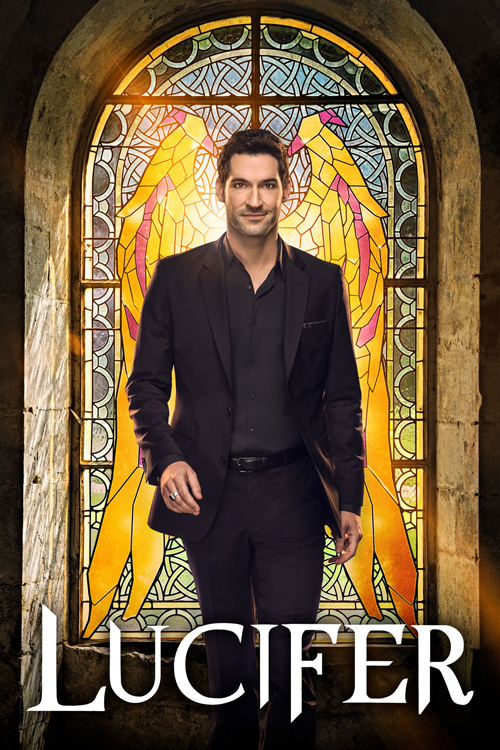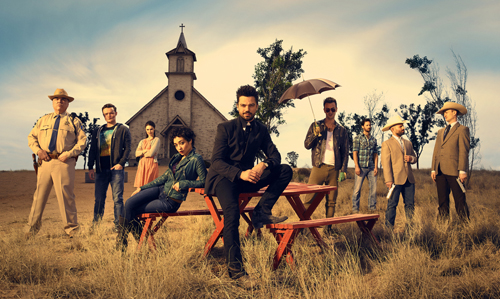
Your complimentary articles
You’ve read one of your four complimentary articles for this month.
You can read four articles free per month. To have complete access to the thousands of philosophy articles on this site, please
Television
God’s Silence on TV
Hugh Hamilton looks at how God is presented. Spoilers for the shows Lucifer, Preacher and Supernatural ahead.
With the Western world becoming more secular, the public are more open to non-reverential depictions of God. In particular, TV creatives are making shows about what God might be like, with a lot of it not positive. He’s often portrayed as uncaring or oblivious to human suffering – although there are shows that portray him as the classic wise and loving deity whom the protagonist grudgingly comes to like.
So, what are the most popular portrayals of God on television, and why is he portrayed in these ways?

Lucifer stills © Warner Bros Television
Lucifer
Originally a spin-off of the Sandman series written by Neil Gaiman, the Lucifer graphic novels were adapted into a TV show for Fox until that was cancelled, and then revived for Netflix. It ran from 2016-2021, and received eighteen billion minutes of eyeball time.
Despite the religious themes, and Lucifer being the main character, God himself did not explicitly appear until Season 5, Episode 8. In that show, despite Lucifer’s previous assertions, God is shown to be a caring and loving, albeit slightly aloof, father, who ultimately knows what’s best for his children. In the show he often works in mysterious ways that come off as frustrating until the final reveal of his plans. This, for many people, mirrors their own experience with the man upstairs. Lucifer balances wrathful and jealous depictions of God with loving ones, which results in God appearing quite complex, almost human. This makes for a fresh interpretation of the divine in modern media, which is not always known for its subtle depictions of theological themes.
In the show, Lucifer, (Prince of Darkness etc etc) talks in surprisingly positive terms about God and Christianity. Episodes like ‘A Priest Walks Into A Bar’ depict Christians in a favourable light. Refreshingly the show encourages us to have empathy for all, and to not assume that we know who anyone is without actually getting to know them, because why should we take what someone says about another person as the definitive truth? Indeed, a large theme within the show is the idea that perhaps Lucifer is misunderstood, and more generally, that maybe those we automatically assume to be evil aren’t quite as bad as we first think. This makes the viewers consider their own prejudices, and calls for us to instead have compassion for those we see as evil. To quote (atheist) Mark Twain from his Autobiography, “But who prays for Satan? Who in eighteen centuries, has had the common humanity to pray for the one sinner that needed it most?”

Not your usual church picnic
Preacher images © Sony Pictures Television/AMC
Preacher
Another graphic novel turned TV show, Preacher, originally written by Garth Ennis and Steve Dillon, is about a morally dubious underground fight club host turned bank robber turned preacher called Jesse Custer. Jesse becomes host to the spawn of an angel and a demon, which gives him the power to make others do what he says. In the Season 1 finale, Jesse talks to ‘God’ in front of his congregation, only to discover that God has gone missing. He spends the next two seasons trying to find God, only to discover that God is… a jerk. The God of Preacher is a cruel, controlling, trickster who spends time dressing up in a BDSM rubber dog suit while the world is falling apart. In the final season, Jesse and his friends fight God to prevent the apocalypse, and end up killing him.
Overall a pretty scathing take on God by Preacher; but perhaps a good reflection of Ennis’ and Dillon’s frustrations with a seemingly silent God who allows disease and natural disasters to harm his creation. They see God as a pervert because they apparently conclude that someone who has the power to prevent natural evils and doesn’t must instead take pleasure from them. These are frustrations that are shared by even the most devout people, sometimes. But the writers choose to use these feelings of helplessness to create stories for the people who feel as if God has abandoned them. While many years ago this might have been labelled ‘blasphemy’ and maybe wouldn’t have made it onto the air, modern secularism means that stories like Preacher are now not so quickly dismissed as heretical. In fact, they’re commentaries on human emotions towards God. Religious people who outright dismiss Preacher miss out on an excellent story about humanity’s struggle with religion in a world of suffering.

Supernatural image © Warner Bros Television
Supernatural
Supernatural was a major staple of television running for fifteen seasons from 2005-2020. It was the story of two brothers, Sam and Dean Winchester, who hunt down supernatural creatures. Despite them battling demonic creatures, and even Lucifer, the idea that God exists doesn’t arise until Season 4, when they meet Castiel, the angel of Thursdays, who remains their close companion until the very end. Although this angel is friendly and helpful, the other angels are actually the villains, as they don’t care for humans at all: in fact, humans are mere pawns in the war between heaven and hell. As in Preacher, God is again found to be missing in action, although this is far more of a B-plot in Supernatural and doesn’t affect the story much, except to explain how all these divine wars can be happening and why the world keeps almost ending.
God himself finally appears in Season 11, or rather reveals his true identity as Chuck, the author/prophet who disappeared in the Season 5 finale.
In Season 4 Chuck was introduced as an author who wrote about the events of Supernatural without ever being present or aware that they were real. When he discovers that what he’s writing about is true, he proclaims, “Obviously, I am God… a cruel, cruel, capricious God” who had been torturing the Winchesters for interesting plot points. However, God is not quite self-aware enough to end the torture of the Winchesters, because it continues. So when Chuck is revealed to be God, the Winchesters have a few choice words for him, saying:
“You’ve been gone a long, long time and there’s so much crap that has gone down on the earth for thousands of years. I mean the plagues and wars and slaughters, and you were… I don’t know… writing books and going to fan conventions. Were you even aware, or did you just tune it out?… You did nothing… People pray to you; people build churches for you and fight wars in your name, and you did nothing.”
These are the sort of things we often want to ask God: Why does he have to leave us to suffer? What purpose does that serve?
Supernatural eventually strips God of his power and replaces him with Satan’s child, Jack, who plays a more proactive role in the world and is in many ways an improvement.
The show is perhaps a reflection of the feeling of insignificance we sometimes experience as individuals in the face of a vast and often baffling universe. It also addresses the frustrations that religious people have with a silent God, who apparently just watches our suffering without acting.
Supernatural takes a somewhat different stance to the other shows. It presents God as an absent father and suggests we humans must learn to move on from him and grow on our own; that if we don’t, then we’re going to be stuck in a never-ending cycle of dependency on someone who does not appear to answer when we call. Supernatural is neither pro- or anti-Christianity; rather, it is pro-human. The show encourages people to take control of their own fate and not leave it up to a divine being who may not even be there. Overall, Supernatural is a long and elaborate look at who God is to us and how we are to navigate life with a silent God.
God has many faces in television, and many of them offer valuable insights on how humanity feels about him. To refuse to engage with them because they do not align with your personal ideas of God would be a pity. These shows don’t tell us who God actually is, and they never really claim to. But what they do instead is to give us a look at how people come to terms with the idea of God and the role he plays in their lives, whether he exists or not.
© Hugh Hamilton 2025
Hugh Hamilton is a student at Bexhill Sixth Form College.









